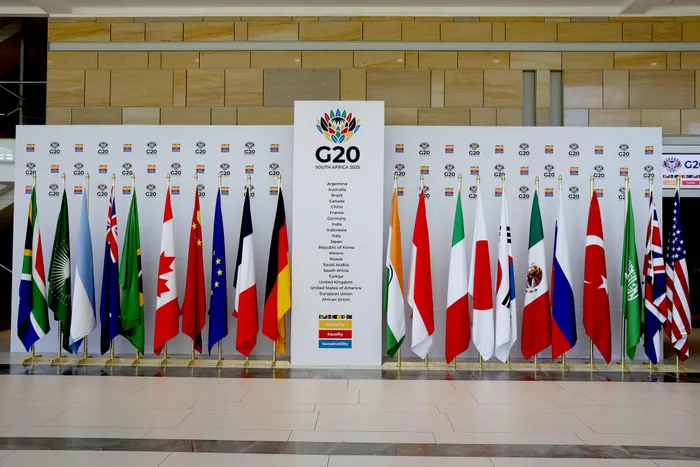
Over the course of South Africa’s Presidency of the G20, businesses and policymakers have created a shared agenda for job creation and economic participation, says the author.
Image: Supplied
Amid ongoing global transformation, employment, education and business innovation constitute essential pillars in promoting sustainable socio-economic progress and maintaining long-term stability. I believe the private and public sectors complement each other in supporting this progress toward politically stable societies and cohesive economies.
Over the course of South Africa’s Presidency of the G20, businesses and policymakers have created a shared agenda for job creation and economic participation. The recommendations of the B20 Employment and Education Task Force address several challenges to tackling the current economic complexities, including
The B20’s Employment and Education Task Force resolved that collectively we must go beyond the “what” and provide practical “how” suggestions through consistent business-to-government dialogue.
The Task Force believes government and business can shape the megatrends—digitalisation, environmental pressures and demographics, for example, to connect more people to opportunities, be more inclusive and improve employment outcomes. This requires revisiting outdated policies and adapting to today’s landscape.
Central to our recommendations is promoting a business agenda that encourages job growth and increases labour market participation, important for political stability and social cohesion. The Task Force seeks an alignment of finance, education and employment with job creation policies. As working practices evolve, we look for ways to collaborate with governments in shaping regulation that supports new employment forms and, particularly, helps micro, small and medium enterprises (MSMEs) thrive. As an imperative, this includes pursuing women’s economic empowerment by increasing female labour force participation, thereby unlocking substantial global economic gains.
In 2024, 60% of women's global employment came from the informal economy. Between 1991 and 2023, men were at least 1.5 times more likely to be employed than women.
How can we significantly address these discrepancies?
The G20 Brisbane Goals (2014) pledged to reduce the gender gap in labour force participation by 25% by 2025, bringing over 100 million women into the G20 labour market. Closing gender gaps could raise global GDP by over 20%. Increasing women's workforce participation improves productivity and resource allocation, while women's economic empowerment benefits society at large.
The most pragmatic approach would be to build on the Brisbane “25 by 25” commitment by partnering with government to draw up an actionable, practical and impactful set of suggestions to cut the male-female participation gap further.
The B20 highlights the need for ongoing cooperation between finance and employment authorities as a key step, not an endpoint. Inter-ministerial collaboration aligns public finances with labour-market objectives, supports job creation and promotes workforce development. It enables policy innovation and peer learning by sharing best practices. It aims to develop best-practice regulatory frameworks for flexible work arrangements to streamline business operations, like shared social security contributions for gig workers. We may look at creating guidelines for micro-entrepreneurs and SMEs by offering employment-linked incentives and access to digital platforms. Our goal is to identify investments that create jobs, ensuring effective resource allocation for employment growth, and economic prosperity.
The G20 Summit in November is an opportunity to foster increased collaboration between the B20 and G20, serving as a springboard rather than an endpoint. Ongoing dialogue between governments and businesses is essential to maintain job creation momentum and enhance employment opportunities through consistent exchanges of ideas and strategies.
The goal is to expand economic empowerment and enable policy interventions, from tax-code reviews to B20-endorsed employer platforms which can contribute to a clear, measurable pathway towards an equitable and participatory workforce.
The formal labour market has shifted, requiring updated policies to match changing employer and worker relationships. People now transition between diverse jobs and work formats, aided by digital technologies and AI, driving flexible work arrangements. A pressing challenge for G20 governments is to recognise the impending shifts in the labour market driven by artificial intelligence. In this evolving job landscape, investment in demand-led reskilling and aligning upskilling efforts with adult learning and lifelong education recommendations should attempt to include everyone, including women.
The G20 Youth Employment Compact encourages mechanisms and partnerships—like the digital platforms for job matching (like SAYouth.mobi in South Africa) and demand-led skills training (Brazil’s SENAI)—to further business-government collaborations, creating apprenticeships and entry-level jobs, using real-time labour data to align training with workforce needs. Such efforts enable policy strategies integrating work and social protection to support economic mobility, foster growth and alleviate poverty.
The B20 support highlights the power of business-to-government dialogue to transform commitments into action. Through cooperation with government, linking finance, education, employment and labour, digital and gender ministries can create a cohesive approach, recognising labour-market reforms as fiscally sound investments in stability. We also acknowledge and draw on international organisations like the OECD and ILO, which provide essential technical assistance and data-driven monitoring.
We seek a process that will accelerate prior initiatives and welcome the chance to engage G20 ministers to consider our recommendations at the forthcoming Summit to ensure economic empowerment is integrated into job-creation initiatives. Through ongoing B20-G20 collaboration, we can provide essential support to achieve our mutual goal of job creation and equitable economic prosperity.

Shadi Chauke is Group Executive: Corporate Affairs and Sustainability, Sanlam Group
Image: Supplied
Shadi Chauke is Group Executive: Corporate Affairs and Sustainability, Sanlam Group. She also serves as the Deputy Chair of the B20 Employment and Education Task Force
BUSINESS REPORT
Related Topics: